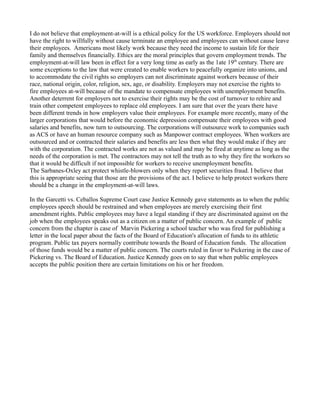
Dis 1 week 2
- 1. I do not believe that employment-at-will is a ethical policy for the US workforce. Employers should not have the right to willfully without cause terminate an employee and employees can without cause leave their employees. Americans most likely work because they need the income to sustain life for their family and themselves financially. Ethics are the moral principles that govern employment trends. The employment-at-will law been in effect for a very long time as early as the 1ate 19th century. There are some exceptions to the law that were created to enable workers to peacefully organize into unions, and to accommodate the civil rights so employers can not discriminate against workers because of their race, national origin, color, religion, sex, age, or disability. Employers may not exercise the rights to fire employees at-will because of the mandate to compensate employees with unemployment benefits. Another deterrent for employers not to exercise their rights may be the cost of turnover to rehire and train other competent employees to replace old employees. I am sure that over the years there have been different trends in how employers value their employees. For example more recently, many of the larger corporations that would before the economic depression compensate their employees with good salaries and benefits, now turn to outsourcing. The corporations will outsource work to companies such as ACS or have an human resource company such as Manpower contract employees. When workers are outsourced and or contracted their salaries and benefits are less then what they would make if they are with the corporation. The contracted works are not as valued and may be fired at anytime as long as the needs of the corporation is met. The contractors may not tell the truth as to why they fire the workers so that it would be difficult if not impossible for workers to receive unemployment benefits. The Sarbanes-Oxley act protect whistle-blowers only when they report securities fraud. I believe that this is appropriate seeing that those are the provisions of the act. I believe to help protect workers there should be a change in the employment-at-will laws. In the Garcetti vs. Ceballos Supreme Court case Justice Kennedy gave statements as to when the public employees speech should be restrained and when employees are merely exercising their first amendment rights. Public employees may have a legal standing if they are discriminated against on the job when the employees speaks out as a citizen on a matter of public concern. An example of public concern from the chapter is case of Marvin Pickering a school teacher who was fired for publishing a letter in the local paper about the facts of the Board of Education's allocation of funds to its athletic program. Public tax payers normally contribute towards the Board of Education funds. The allocation of those funds would be a matter of public concern. The courts ruled in favor to Pickering in the case of Pickering vs. The Board of Education. Justice Kennedy goes on to say that when public employees accepts the public position there are certain limitations on his or her freedom.